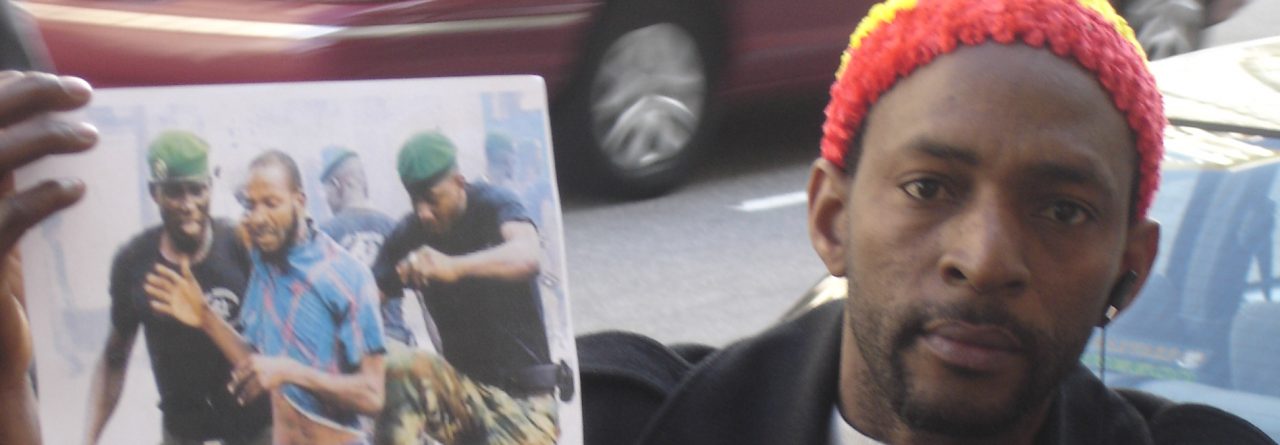Below is the translation of the article into English via Google with editing by Guinea Oye. The French version follows.
Mr. Alexander Laskaris, the Ambassador of the US to Conakry is the first electoral agent for Alpha Conde
President Alpha Conde has a VIP electoral agent who is a salesman of the fraudulent victory of the RPG rainbow sky in the elections of September 28. This is the case of His Excellency the Ambassador of the United States in Conakry and his name is Mr. Alexander Laskaris. He is the self-proclaimed sponsor of Bakary Fofana’s CENI. All his statements are consistent with the consolidation of fraud and a farce orchestrated by Guinean authorities.
No sooner had the people of Guinea finished voting, Mr. LASKARIS stated that “the results are not important.” It makes you wonder then why the people even bothered to vote. Behind his muffled speech, he hid the message the results would have to be accepted regardless. In addition, while the observation mission of the European Union criticized the dismal organization of these elections and CENI’s mismanagement, Mr. LASKARIS announced from his perch at the US embassy that “the vote was free, democratic and transparent, “ as if Mr. Ambassador was suffering from political myopia or electoral blindness. Continuing with his turpitude, Mr. LASKARIS is trying to force the opposition to accept fraudulent results “that do not count.” Between trickery and threats, he stops at nothing. He goes deeply and more dangerously than Bakary Fofana, the president of the CENI, which itself under the boot of Alpha Conde.
In the pre-election phase, Mr. LASKARIS did not hesitate to assert that “the opposition had no right to prevent the elections.” And, he came close to saying “even in the case of fraud.” The behavior of this Ambassador from the “messianic” country of freedom, democracy and human rights, it is puzzling and alarming. Is he an isolated accomplice who ignores the political and diplomatic line of his country? Or is he the embodiment of this diplomatic line that would support a prominent dictator who becomes worse by the day? These are some of the questions everybody is asking in Conakry.
As we await answers to these questions, to which His Excellency will probably not miss the opportunity to supply, the people will put their hands over their ears in order to not have their ear drums blown out by the shattering statements of Mr. LASKARIS.. It is time he lowers his decibels because it is increasingly painful for the hearing of the people of Guinea.
Monsieur Alexander LASKARIS, ambassadeur des USA à Conakry est le 1er agent électoral du président Alpha Condé
Le président Alpha Condé dispose d’un agent électoral VIP et qui se fait le VRP de la victoire frauduleuse du RPG arc-en-ciel aux législatives du 28 septembre dernier. Il s’agit en l’occurrence de son excellence Monsieur l’ambassadeur des Etats-Unis à Conakry. Monsieur LASKARIS Alexander, c’est son nom, est le parrain auto désigné de la CENI de Bakary Fofana. Toutes ses déclarations vont dans le sens de la consolidation des fraudes et des mascarades orchestrées par les autorités Guinéennes.
A peine, le peuple de Guinée a séché l’ancre au doigt, Monsieur LASKARIS déclare que « les résultats ne sont pas importants ». C’est à se demander pourquoi le peuple a alors voté. Derrière ce discours feutré, se cachait le message qu’il faudrait accepter les résultats, quels qu’ils soient. En outre, alors que la mission d’observation de l’Union Européenne, foudroyait l’organisation lamentable de ces élections et leur gestion catastrophique par la CENI, Monsieur LASKARIS annonçait du haut de sa sainte ambassade que « le vote a été libre, démocratique et transparent ». Comme si Monsieur l’ambassadeur est frappé de myopie politique ou de cécité électorale. Aujourd’hui encore dans sa turpitude, Monsieur LASKARIS est dans toutes les manœuvres visant à faire accepter les résultats « qui ne comptent pas » par l’opposition. Entre ruse et menaces, il n’hésite à rien. Il y va à fond, bien plus dangereusement que Bakary Fofana, l’autre agent électoral de la CENI elle-même à la solde du président Alpha Condé.
Dans la phase préélectorale Monsieur LASKARIS n’avait pas hésité d’affirmer que « l’opposition n’avait pas le droit d’empêcher les élections ». C’est à peine qu’il n’ajouta « même dans la fraude ». L’attitude de Monsieur l’ambassadeur du pays, « messianique » de la liberté, de la démocratie et des droits de l’homme, interpelle et choque. Serait-il un complice isolé désobéissant la ligne politique et diplomatique de son pays ? Où est-il, l’incarnation de cette ligne diplomatique qui soutiendrait ainsi un éminent dictateur en pleine phase de croissance et d’ascension ? Ce sont là, quelques questions qui brûlent les lèvres à Conakry.
En attendant les réponses à ces questions, que son excellence ne manquera probablement pas d’apporter, le peuple se bouche les oreilles pour ne pas se faire péter le tympan par les fracassantes déclarations de Monsieur LASKARIS. Il est temps qu’il baisse ses décibels qui font de plus en plus mal à l’ouïe de la nation GUINEENNE.
La Rédaction de www.guinee58.com.



